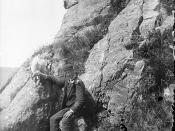1 Timothy 3:1-13
"The Leadership of the Church"
"Paul writes to Timothy, who as a young evangelist is facing serious challenges to faith an doctrine within the church at Ephesus (Narrated 1613)." Paul talks about matters of church organization and conduct, the role of women, qualifications of elders and deacons, and the role of women in the church.
"Because leadership is always so determinative on the well being and spiritual growth of the body of Christ, one of the first things the Apostle Paul saw to was the appointment of the elders in every church as under shepherds of Gods people (Keathley)." 1 Timothy chapter 3:1-13 describes how appointed church leaders should conduct themselves in order to be qualified to serve the church. "In 1 Timothy, the church membership reflects the social order of the larger Greco-Roman society external to it. Bishops, deacons, and elders govern a mixed group composed of different social classes, including heads of households, masters, slaves, wives, widows, and children (Harris 367)."
How the church is portrayed is very important. The church wants someone who can help build the church up to do great things, help people in need, and continue to do God's will. The church does not want someone who is disrespectful and dishonest. So that is why Paul wrote the guidelines on what each church official should stand by.
Paul first decribes the bishop, which literally means overseer. The bishop in the early church may also been called an elder. The meaning of the word indicates that the bishop had administrative responsibilities in the church. In addition to the bishop's administrative tasks, he bishop also needed to be a qualified teacher. "Bishops played a significant role, therefore, in helping to maintain the doctrinal health of the churches (Tolbert 109)."
The church has...
![[Portrait of Les Paul, Fat Tuesday, New York, N.Y., ca. 1980s] (LOC)](https://s.writework.com/uploads/5/51318/portrait-les-paul-fat-tuesday-new-york-n-y-ca-1980s-loc-thumb.jpg)

